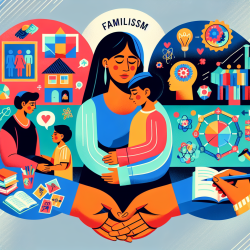In the realm of special education and audiological rehabilitation, the journey of identity construction among deaf adolescents and young adults (AYA) is a nuanced and intricate process. The recent study, "Understanding identity construction among deaf adolescents and young adults: implications for the delivery of person and family-centered care in audiological rehabilitation," offers critical insights that can significantly enhance the delivery of person and family-centered care (PFCC). Here, we explore key findings from this research and provide actionable steps for practitioners to integrate these insights into their practice.
Understanding Identity Construction
The study highlights that identity construction for deaf AYA is a multifaceted process occurring at personal, relational, and societal levels. At the personal level, AYA develop self-concepts that include their personality traits, skills, talents, and aspirations. Relationally, identity is shaped through interactions with peers, family, and educators. Societally, AYA navigate the challenges of being deaf in a predominantly hearing world, which significantly impacts their identity formation.
Key Themes from the Study
The research identified four superordinate themes in the narratives of deaf AYA:
- Creating a Self-Concept: AYA's self-concepts are shaped by their personality traits, skills, talents, and future aspirations. They often distance themselves from the label of disability, focusing instead on their capabilities and normality.
- Belonging: The sense of belonging is crucial for AYA. Schools, family, and peer groups provide safe spaces where AYA feel understood and accepted.
- Stress: The process of identity construction is stressful, with AYA facing stigmatization, communication barriers, and emotional strain. These stressors can lead to feelings of isolation and psychological distress.
- Being Deaf: Being deaf is not just a physiological condition but a context that shapes their entire being. Coping strategies, employability concerns, and social challenges are inherent parts of their lived experiences.
Implications for Practitioners
1. Prioritize Self-Concept in PFCC
Understanding and acknowledging AYA's self-concepts can significantly improve the rapport between practitioners and AYA. Integrating their personality traits, skills, talents, and aspirations into audiological interventions can foster a more personalized and effective care plan.
2. Foster a Sense of Belonging
Creating environments where AYA feel they belong is essential. This includes fostering positive relationships within schools, peer groups, and families. Practitioners can facilitate peer-led support groups and family counseling sessions to strengthen these bonds.
3. Address Stress and Stigmatization
Developing coping strategies to manage stress and stigmatization is critical. Practitioners should provide resources and training on how to handle negative encounters and foster resilience. This could include assertiveness training and mental health support.
4. Embrace the Full Context of Being Deaf
Practitioners should understand that being deaf encompasses more than just hearing loss. It involves navigating societal challenges and leveraging assistive technologies like hearing aids. Emphasizing positive attitudes towards these technologies and advocating for public awareness can alleviate some of the social burdens AYA face.
Encouraging Further Research
While this study provides a foundational understanding of identity construction among deaf AYA, there is a need for ongoing research to explore the impact of different school environments, socio-economic backgrounds, and family dynamics on identity formation. Practitioners are encouraged to stay informed through continuous professional development and engage in research initiatives to further enhance their practice.To read the original research paper, please follow this link:
Understanding identity construction among deaf adolescents and young adults: implications for the delivery of person and family-centered care in audiological rehabilitation.










